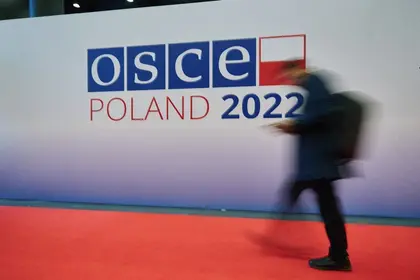The outgoing chair of the Organization for Security and Co-operation in Europe on Friday called its future into question following a lack of consensus between Russia and other members states.
Founded at the height of the Cold War to foster relations between the Western and Eastern blocks, the OSCE has been caught in an impasse over the Ukraine war that has limited its ability to function.
JOIN US ON TELEGRAM
Follow our coverage of the war on the @Kyivpost_official.
“This has been the most difficult year in the history of the organisation,” Polish Foreign Minister Zbigniew Rau told reporters at its annual ministerial conference.
“We have to look for the solutions that will make it possible to keep the organisation going,” said Rau, whose country currently holds the body’s rotating chairmanship.
The problem is that all decisions by the organisation are adopted by consensus. But since its 57 members — across three continents — include both Russia and Ukraine, its activity has been hindered by several Russian vetoes.
Moscow has blocked the renewal of the OSCE permanent mission in Ukraine, and the extension of the mission tracking the conflict between the government and pro-Russian separatists in eastern Ukraine since 2014.
“Our organisation is based upon consensus,” Rau said at the end of the two-day security talks in Lodz, Poland.
“We have found… ways to keep the organisation going — but the instruments have only a temporary character.

What if Russia Wins?
“And this brings us to the point which, whether we want it or not, is leading to starting a discussion (on) what is the future of the organisation,” he added.
This year’s conference had failed to pass a single resolution with the backing of all member states because of this lack of consensus, said Rau.
Founded in 1975, the OSCE includes both NATO countries and allies of Moscow.
You can also highlight the text and press Ctrl + Enter






